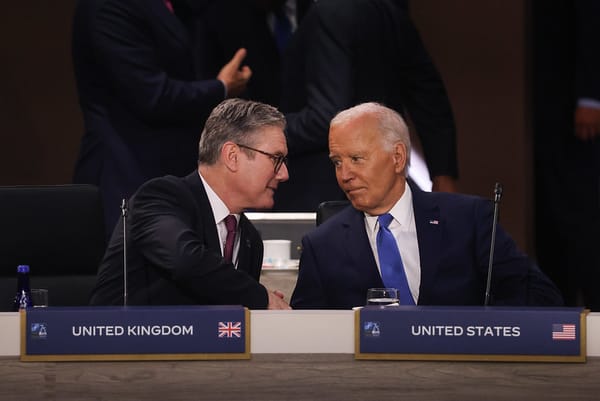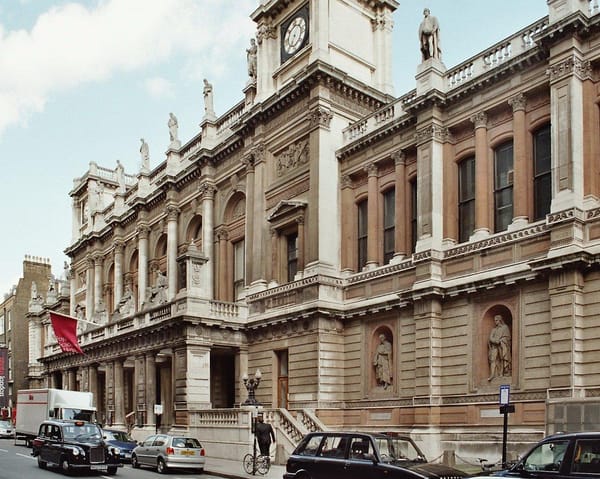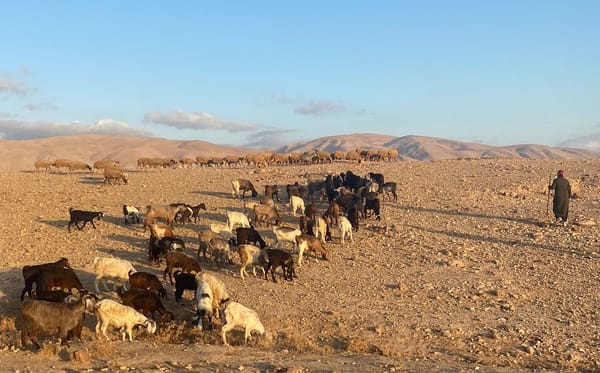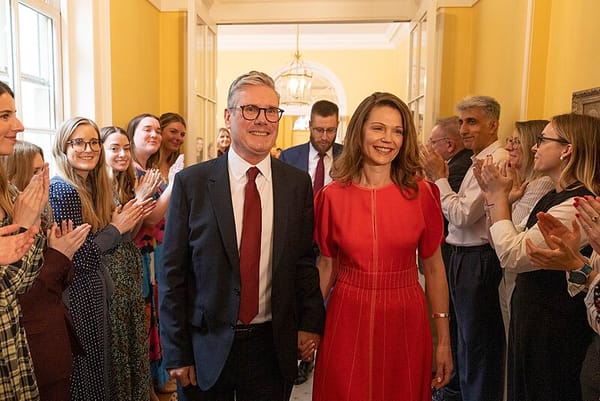Whose streets?: Protest since 7 October
Exploring the responses of British Muslims and Jews to a new era of mass protest.

One evening in mid-November, I attended a small demonstration outside the Egyptian embassy calling on Egypt to open the Rafah border crossing and allow humanitarian aid into Gaza. About 200 protesters gathered in Mayfair around a group leading spirited chants in English and Arabic, accompanied by beating drums.
Police officers prevented protesters from getting near the embassy, so we stood across the road and chanted along – or clapped on the beat if we didn’t speak Arabic – for about an hour. The cops stood glaring with folded arms at the crowd of mostly young women.
As the protest was dispersing, I asked one of the attendees, a PhD student wearing a grey hijab, why she had chosen to attend. It wasn’t one of the marches attended by hundreds of thousands, but Vera*, who is studying at UCL, said her experiences of Islamophobia since 7 October had “triggered [her] to show up to all of these.”
One incident on campus stood out. “I was just going round uni and someone was shouting at me, ‘Fucking Muslims. Each one of them suck. They just suck,’” she said. “I have received quite a lot of hate speech, even in the university facility, and also after doing a protest.”
Because of her experiences, Vera said she was uncomfortable leaving protests alone as a visibly Muslim woman.
“You sense the culture of intimidation,” says Hamza Ali Shah, a British-Palestinian journalist and contributor to Vashti. “Even on the way to a protest, when I go with my family, at what point can you showcase the keffiyeh or any kind of symbolism? You’re constantly looking over your shoulder.”
A Rorschach test for antisemitsm
Since 7 October, protest has been at the centre of political life in the UK, from the record-breaking numbers at November’s Palestine solidarity march, to anti-antisemitism protests championed by elements of the right and far-right, to individual acts of resistance, remembrance and mourning.
Over this same period, Islamophobic and antisemitic incidents have markedly increased. These interconnected phenomena – both products of imperialism and white supremacy – have been instrumentalised by the government, right-wing commentators and some communal institutions, informing how members of the two communities experience and relate to protest.
While characterising the Israeli campaign in Gaza as part of a larger conflict between Jews and Muslims is both dangerous and disingenuous, it is necessary to hold space for the lived realities of Muslim and Jewish communities in the UK, where the events in Palestine have also had an impact on daily life.
A pernicious narrative of sectarian division is pervasive in parts of the Jewish community. Anton Alexander, a Jewish retired solicitor, believes the pro-Palestine protests have been so large because “everybody hates the Jews”. His views are widely echoed by right-wing Jewish commentators: the Jewish Chronicle called the pro-Palestine march on Armistice Day “one of the most grotesque carnivals of Jew hate London has witnessed”, while the paper’s former editor Stephen Pollard claimed the protests were “intended to strike fear into Jews”.
Having attended multiple ceasefire marches, I have not encountered antisemitism in person. In fact, I was warmly received when marching with a sign reading “This queer Jew says free Palestine”. I do not deny the presence of antisemitic chants or placards, but they have not been a widespread, characteristic feature of protests for me or the thousands of Jews making up the Jewish bloc.
That said, there has been an undeniable rise in antisemitic incidents since the war began, especially in London. Just days ago, a man wielding a knife threatened workers and customers at a kosher supermarket in Golders Green, not long after three Israelis were attacked in Leicester Square for speaking Hebrew. Haredi Jews are frequent targets of physical and verbal abuse, and Jewish schools and businesses have been vandalised.
It is important to remember that these attacks have no clear connection to the protests, though the Campaign Against Antisemitism (CAAS) sends observers to document what they consider racist placards and chants. Video compilations, showing both rare instances of actual antisemitism and ambiguous slogans interpreted as such, are then spread online and in the press, and used to paint the marches as wholly hateful.
Hannah*, an official at a non-Orthodox London synagogue, is concerned that this skewed representation creates and instils fear in Jews who have not themselves been victimised. A member of her shul was “caught on the bus when she was going through a protest”, she says. “She saw Palestinian flags and was really freaked out and worried about what they would think if they found out that she was Jewish.”
On the back of this characterisation, the CAAS has been calling for the pro-Palestine marches to be banned for months, and organised a “March Against Antisemitism” in November. After the event, Gideon Falter, the CEO of CAAS, characterised it as “tolerant, decent, mild mannered”. He contrasted this with the “extremism, Islamism, far-leftism” of pro-Palestine marches that might have made people think “Where’s the real Britain gone? This country has lost its soul.” The Times and JC columnist Melanie Phillips was more explicit in her Islamophobia, asking the government to crack down on “Islamic antisemitism”.
“The implication is Muslims are the biggest perpetrators of antisemitism, and now it’s seen as fair game to call any Muslim antisemitic,” says Ali Shah. “These accusations were previously maybe thought, or said behind closed doors, [but] they’re just out in the open now, and it’s colouring the whole [Muslim] community.”
Schools out for Palestine
The protests for a ceasefire have not been banned, but there has been a concurrent narrowing of acceptable speech in British public life.
Raheel Mohammed, director and founder of the anti-Islamophobia charity Maslaha, says there is a sense in British Muslim and Palestinian communities that “they are being collectively punished here, for just showing grief”.
According to Mohammed, this often plays out in schools. “We’re hearing of children being told to take Palestine badges off their bags,” he says. “If children raise their hands in class and ask questions about Palestine, they’re asked to leave the classroom. Teachers are coming up to children and saying, ‘If you say the word Palestinian, it’s illegal.’”
This kind of response is “coming directly from government and the guidance that’s been sent out by the Department for Education”, Mohammed continues. “It puts a real emphasis on supporting Jewish communities through the traumatic events of 7 October, and rightly so, but it doesn’t mention Palestinians at all. It doesn’t talk about how there might also be an increase in Islamophobia affecting Muslim communities in this moment.”
He added that this climate of repression is enabled because “the conditions to do that already exist through policies like Prevent”, to which the guidance encourages teachers to make referrals. “Parents are being sent letters from headteachers, which are bordering on being quite patronising and threatening,” he adds. “Like: ‘if your child goes on this march, there might be consequences for that.’”
However, Mohammed believes this censorship is creating a cultural tide the government may be unable to quell. “We have very young children becoming politicised and really hyper-critically aware of the failure of politicians to stop war crimes, and the killing of children,” he says. “That’s the thing that scares schools and I think probably scares governments as well.”
Additionally, Mohammed argues that despite the government’s “cynical approach to divide us”, the pro-Palestine protests are “strengthening relationships across different communities and across different forms of marginalisation and oppression.”
“This isn’t just about something that’s happening over there. It absolutely affects our communities here, and also our communities get punished for it. And by our communities, I don’t just mean Muslim communities. We’re also seeing and hearing our Jewish brothers and sisters who are resisting with us being attacked.”
Am I a traitor?
One example of those cross-communal relationships is becoming increasingly hard to ignore. A growing contingent of vocally pro-Palestine Jews presents a threat to the expectation of division between Jews and Muslims, and maybe, eventually, to the default Zionism of all Jewish spaces.
Indeed, Jews who express support for Palestine seem to most often attract abuse – including from other Jews – that weaponises our Jewishness against us. After a tweet of mine about attending a pro-Palestinian march in London went viral, I received a deluge of comments doubting my Jewish identity, calling me a “kapo”, and gleefully informing me that a vaguely defined “they” would kill me.
By insisting that supporting Palestine and opposing antisemitism are contradictory, the Jewish establishment appears to reinforce these ideas. Last week, police prevented activists from Jewish Action for Palestine and Na’amod from joining a march against antisemitism in Manchester. The Community Security Trust (CST), which along with the police provided security for the event, claimed to have no part in the decision, but videos posted by Na’amod revealed that officers said the CST and the organisers had given instructions not to let them in because of what was written on their banners.
At the same time, faced with the decision to speak out in support of Palestinian liberation or stay silent, many Jews have been forced to confront the tension between their progressive beliefs and received assumptions and expectations stemming from their personal connections to Zionism.
Mizy Clifton, a Jewish early-career journalist, is one of the many who has found himself grappling with this contradiction. Having grown up surrounded by Zionist rhetoric at his Jewish school, he has been struggling with his discomfort over attending pro-Palestine marches. “I’ve been trying to write about what’s going on in Gaza and in the West Bank,” he says. “I’ve been trying to use my background in that respect, but I haven’t been participating in any activism or organising in a traditional sense.”
Clifton attended a Na’amod-organised vigil, but thinks he would be uncomfortable at the larger pro-Palestinian marches due to the antisemitic elements he worries about encountering and some slogans he finds confronting, such as “From the river to sea, Palestine will be free”.
Having heard it in person for the first time recently, Clifton was surprised by the effect the phrase had on him. “I don’t understand it as antisemitic,” he says. “But when I heard people chanting that, I did have this kind of knee-jerk, fearful reaction.” Reflecting on it, he said: “It does suggest just how deep my own attachment to Israel perhaps goes, even though my politics don’t really square with that any more.”
He is also concerned what some of his community would think if they knew he had attended. “I have friends who are serving in the IDF, and I also have a friend who’s just come back from Israel who is terrified for her friends who are serving in the IDF,” he adds. “Maybe it’s cowardice.”
But, he goes on, “I’m very much opposed to the wholesale smearing of the protests and I think we can see how the right in the UK is weaponising Jewish pain to use as a stick to beat Palestinians.
“I really struggle to find spaces where I, as a non-Zionist left-wing Jew, feel safe and seen, but more importantly where the oppression of Palestinians that we’re seeing is being responded to and being challenged.”
Solidarity: the final frontier
The spaces Clifton describes appear to be growing, in some cases by building on existing relationships.
“Muslims and Jews are still talking,” says Hannah. “There are still interfaith events happening. Maybe they’ve been strained but that is even more reason to keep pushing and keep trying.”
New possibilities are also coming into view. More and more Jews are attending the protests. Black-Jewish Alliance tweeted from the London ceasefire march on 13 January: “The Jewish bloc is over 3,000 strong today.” That figure represents over one percent of Jews in the UK.
“I marched with the Jewish bloc a few marches ago and I know a couple of the people in the Black-Jewish Alliance, and that’s really powerful as well,” says Mohammed. “We have to fight all of those oppressions and all of those racisms together.”
Ali Shah also believes in the power of solidarity, and questions the expectation of division between Jewish and Muslim communities. “Some of the most unwavering allies I’ve worked with, whether it’s editors, whether it’s people on the ground, are from the Jewish community,” he said.
“You value it a bit more because you’ve been told not to expect it. But when you sense how genuine it is it almost shocks you, and [then] you think, ‘Why was I shocked to begin with?’” ▼
*These names have been changed.
Sasha Baker is an investigative journalist.




